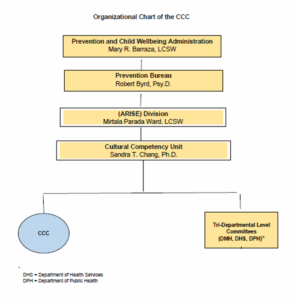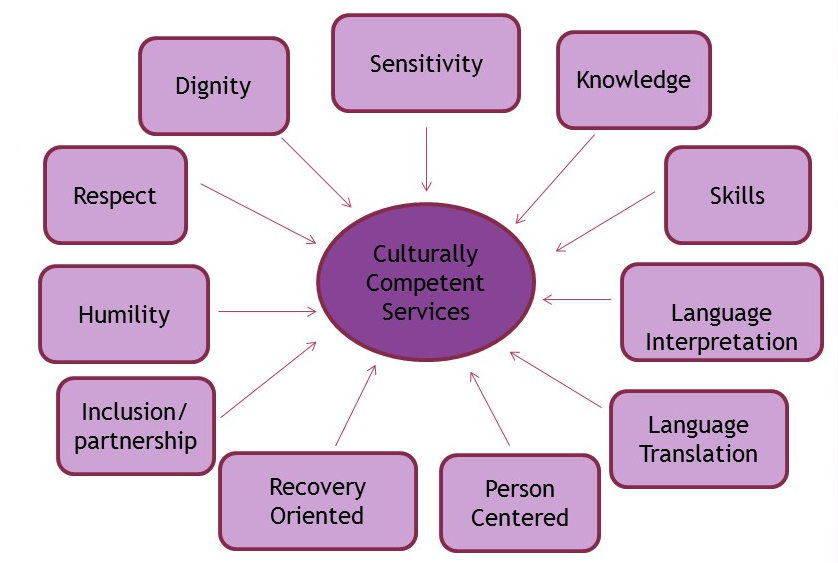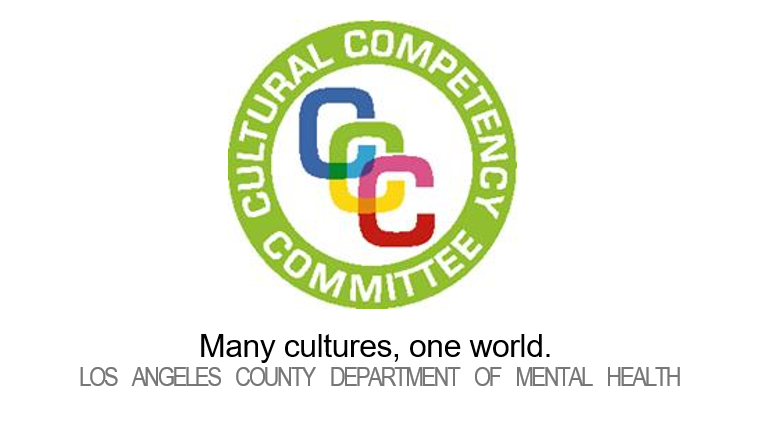The CCU promotes a collective sense of shared responsibility for the delivery of services that address health inequities and meet the needs of Los Angeles County’s cultural diversity inclusive of racial, ethnic, linguistic, age, gender identity, sexual orientation, socioeconomic status, degree of physical and cognitive ability and disability, spirituality and religious beliefs, and lifestyle choices among others. The CCU is housed within the departmental Anti-Racism, Inclusion, Solidarity, and Empowerment (ARISE) Division and has reporting responsibilities to LACDMH’s executive management, the California Department of Health Care Services (DHCS), and the Los Angeles County Board of Supervisors (BOS).
The CCU functions are based on the following premises:
- Cultural competence involves honoring the cultural and linguistic preferences of persons receiving services from LACDMH in order to support their process of healing, recovery, resiliency, and wellbeing.
- LACDMH clinical and administrative programs are most effective when they operate as an integrated network to provide services that take into consideration the cultural and linguistic needs of the communities served.
- The development and delivery of culturally and linguistically responsive, accessible, appropriate, equitable and effective services require collaborative approaches with constituents, community-based organizations and the community as a whole.
- Becoming a culturally competent, inclusive, and responsive system of care is a developmental process. It involves strategic interventions that focus on eliminating mental health disparities and address service gaps. It requires listening, learning and connecting LACDMH with the voice of constituents, their family members, and communities.
CCU Functions
- Enforcement of Federal, State and County regulations pertinent to cultural and linguistic inclusion and responsiveness.
- Development of policies and procedures (P&Ps) that highlight the essential role of cultural competence in the provision of relevant and meaningful services.
- Monitoring of service delivery from a quality improvement perspective to ensure that services are planned, delivered, monitored, and evaluated for cultural and linguistic relevance and appropriateness.
- Development of mechanisms to collect, organize, and track LACDMH data pertinent to Los Angeles County demographics, service utilization, and departmental interventions to reduce mental health disparities.
- Conduction of system-wide cultural competence organizational assessments.
- Development of the LACDMH annual Cultural Competence Plan report in accordance to Title IX and DHCS’ Cultural Competence Plan Requirements.
- Coordination of the cultural and linguistic competence content for triennial Medi-Cal Audits and annual External Quality Review Organization System Reviews.
- Development and delivery of cultural competence trainings and presentations at various departmental venues, LACDMH-sponsored conferences, cross-county and State level summits, community-based organizations, and the community at large.
- Responsiveness to inquiries and requests from executive management, DHCS, and the BOS.
- Provision of technical assistance to LACDMH executive managers, Service Area and Countywide Chiefs, as well as clinical and administrative programs.
- Provision of administrative consultation and support for the Cultural Competency Committee (CCC).
- Interfacing with various stakeholder groups such as CCC, consumer groups, and Quality Improvement Council to ensure that their voice is included in the CCU projects.
- The CCU Program Manager/Ethnic Services Manager is the lead for the LACDMH Language Assistance Services and is actively involved in the Departmental Language Access Plan.
- The CCU staffing includes the two LACDMH Sign Language Specialists who facilitate American Sign Language (ASL) services for clinical appointments such as psychotherapy and psychiatric appointments, departmental cultural events, and departmental stakeholder groups.

The CCU advocates for the following framework for Culturally and Linguistically Inclusive Services

Public Informing Reports
- Annual Cultural Competence Plan
- Department Language Access Plan (DLAP)

